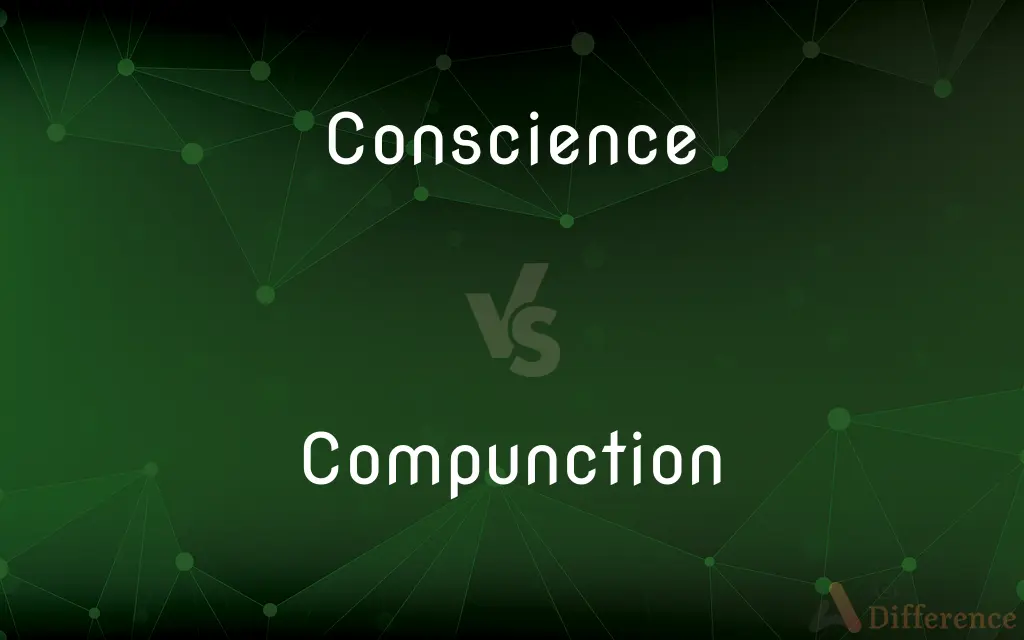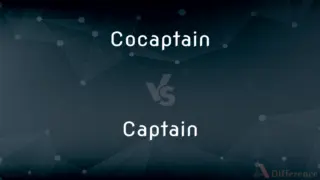Conscience vs. Compunction — What's the Difference?

Difference Between Conscience and Compunction
ADVERTISEMENT
Compare with Definitions
Conscience
Conscience is a cognitive process that elicits emotion and rational associations based on an individual's moral philosophy or value system. Conscience stands in contrast to elicited emotion or thought due to associations based on immediate sensory perceptions and reflexive responses, as in sympathetic central nervous system responses.
Compunction
A feeling of guilt or moral scruple that prevents or follows the doing of something bad
They used their tanks without compunction
Conscience
A person's moral sense of right and wrong, viewed as acting as a guide to one's behaviour
He had a guilty conscience about his desires
Ben was suffering a pang of conscience
Compunction
A strong uneasiness caused by a sense of guilt
Stole the money without compunction.
Conscience
An awareness of morality in regard to one's behavior; a sense of right and wrong that urges one to act morally
Let your conscience be your guide.
ADVERTISEMENT
Compunction
A sting of conscience or a pang of doubt aroused by wrongdoing or the prospect of wrongdoing
"commercial speculators and hired politicians who had no compunction about pillaging their country for personal gain" (Leo Damrosch).
Conscience
A source of moral or ethical judgment or pronouncement
A document that serves as the nation's conscience.
Compunction
A pricking of conscience or a feeling of regret, especially one which is slight or fleeting.
Conscience
Conformity to one's own sense of right conduct
A person of unflagging conscience.
Compunction
A pricking; stimulation.
That acid and piercing spirit which, with such activity and compunction, invadeth the brains and nostrils.
Conscience
The part of the superego in psychoanalysis that judges the ethical nature of one's actions and thoughts and then transmits such determinations to the ego for consideration.
Compunction
A picking of heart; poignant grief proceeding from a sense of guilt or consciousness of causing pain; the sting of conscience.
He acknowledged his disloyalty to the king, with expressions of great compunction.
Conscience
(Obsolete) Consciousness or awareness of something.
Compunction
A feeling of deep regret (usually for some misdeed)
Conscience
The moral sense of right and wrong, chiefly as it affects a person’s own behaviour and forms their attitude to their past actions.
Your conscience is your highest authority.
Conscience
A personification of the moral sense of right and wrong, usually in the form of a person, a being or merely a voice that gives moral lessons and advices.
Conscience
(obsolete) Consciousness; thinking; awareness, especially self-awareness.
Conscience
Knowledge of one's own thoughts or actions; consciousness.
The sweetest cordial we receive, at last,Is conscience of our virtuous actions past.
Conscience
The faculty, power, or inward principle which decides as to the character of one's own actions, purposes, and affections, warning against and condemning that which is wrong, and approving and prompting to that which is right; the moral faculty passing judgment on one's self; the moral sense.
My conscience hath a thousand several tongues,And every tongue brings in a several tale,And every tale condemns me for a villain.
As science means knowledge, conscience etymologically means self-knowledge . . . But the English word implies a moral standard of action in the mind as well as a consciousness of our own actions. . . . Conscience is the reason, employed about questions of right and wrong, and accompanied with the sentiments of approbation and condemnation.
Conscience
The estimate or determination of conscience; conviction or right or duty.
Conscience supposes the existence of some such [i.e., moral] faculty, and properly signifies our consciousness of having acted agreeably or contrary to its directions.
Conscience
Tenderness of feeling; pity.
Conscience
Motivation deriving logically from ethical or moral principles that govern a person's thoughts and actions
Conscience
Conformity to one's own sense of right conduct;
A person of unflagging conscience
Conscience
A feeling of shame when you do something immoral;
He has no conscience about his cruelty
Share Your Discovery

Previous Comparison
Cocaptain vs. Captain
Next Comparison
Bathroom vs. Washroom













































